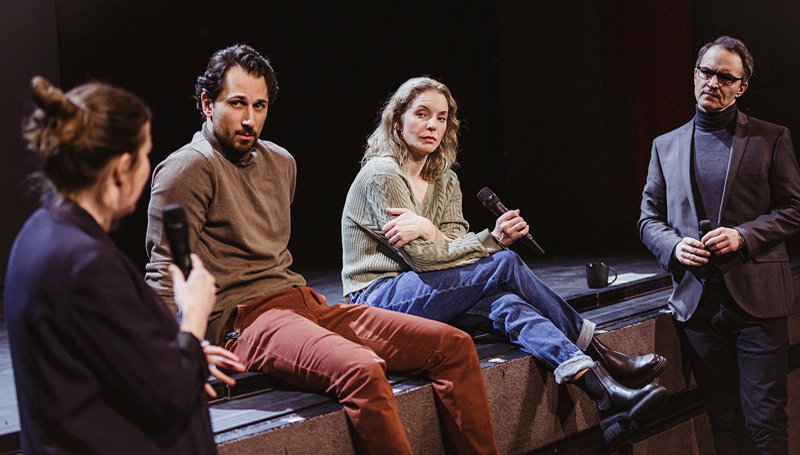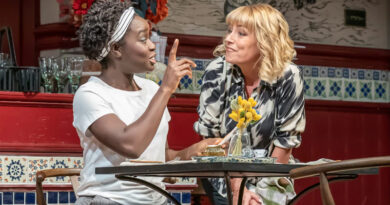“The Writer” at the Théâtre des Capucins
Dana Rufolo in Luxembourg
18 April 2023
The Writer by Ella Hickson was staged under the auspices of Les Théâtres de la ville de Luxembourg during the month of March and into April in its original English language. Similar to the premiere at the Almeida Theatre in 2018, the production was experimental, intense, striking – and the script is extraordinary.

Jenny Beacraft and Céline Camara.
Photo credit: Jeannine Unsen.
Playwright Hickson’s Writer has a high sense of mission for theatre akin to Peter Brook’s concept of Holy Theatre, but her ideals crumble under the man-dominant power structure she sees as inherent in gender relationships: a partial victory in the play is the staging of lesbianism as a pro-feminist strategy. On the night I attended the play, some audience members were confused by these contradictions in the drama, failing to recognize that the play is not a play about lesbianism but a play about weaknesses in the current organisation of our so-called “capitalist” and “patriarchal” society based on obsolete values and stereotypical body images. This potential for confusion is inherent in the script.
But that’s okay. It’s a relief to see the work of a theatre company that has chosen to take risks. Not only that: the Luxembourg production starts with the big feminist ideas of the script and reduces its grip on ideas from there on out just as in the original, but additionally neatly emphasizes that language fails to convey the full impact of life – especially when the main character, the Writer, is sensual and 24. Leave it to a company in Luxembourg, uniquely easy with multilingualism, to be sensitive to the failure of language as an instrument of male dominance.
The Writer develops through four stages or scenes. Initially, an angry young woman, an actress playing the Writer (Jenny Beacraft) bumps into and talks with the theatre’s artistic director on stage after a show that, we learn, has the hallmarks of sexual exploitation in it. In elegant articulate language, the Writer rages against an entertainment industry that hasn’t renounced its roots in Vaudeville chorus girls. The man she addresses on stage who claims to be a stakeholder in the theatre (or better said, the actor playing the director: Daron Yates) meekly attempts to offer the Writer to turn her outrage into a play on the subject of male exploitation in the theatre, which he promises her will be produced. In a plot twist worthy of a master, the Writer reveals that he had made the same proposal to her in a pub when she was 18 after a student drama festival she’d been in to which he had been invited. Furthermore, he’d sealed the offer to stage a play of hers with a kiss and pressure for her to deliver more flesh. So, her anger is real. Palpable. Justified – as we all know since the 2019 #MeToo movement.

Daron Yates and Jenny Beacraft.
Photo credit: Jeannine Unsen.
The Writer’s fury is meta-communicated by the fact that, in this scene and this scene alone, the word “fuck” in a variety of grammatical forms appears at least once in every sentence she utters. Beacraft delivers expletives with the energy of a lava-spitting volcano. When the Writer’s language is articulate, bursting at the seams with the message to practice the ideal of gender equality, Beacraft articulates with the precision of a meat slicer. But her vulgar introjections sabotage her idealism. By perpetually referencing the sexual act in its most undressed form, she signals to the Director and to the audience that sex is on her mind – because it is on his mind, or because she thinks it is on his mind is not made entirely clear.
The Writer is also subject to the laws of the human condition; she has weakened her own angry stance, making it rhetorical in a way that Jimmy Porter never did when he treats Alison as the unredeemable “other”. Hickson’s Writer introjects her own sexual desires for herself into the artistic director listening to her (and possibly getting a hard-on doing so, but that we are not clearly shown), creating a web of imagination where these sexual desires for herself emanating from him project back onto herself. In this “older man’s” male presence, which Yates infuses with a humility and calm that intentionally belie her accusations, the Writer’s words are constantly impassioned. Her complaint that success as a writer for her comes with a price is often true – through her supposition that such pay-outs are never required of a male writer is overly optimistic.
The next scene reveals, Pirandello-style, that the authentic-as-it-happened-appearing first scene was a rehearsal of the first scene in the Writer’s play. Now, in the second scene, in an abrupt rupture of style, the actors sit around the theatre’s authentic artistic director (played by Philipp Alfons Heitmann) and the real-life writer Claire Thill (yes, the same person who is the director of The Writer – more on her role later); they discuss the objective of the drama and the director’s notes, taking comments from actors planted in the audience as well.
We then see the Writer returning to her modern apartment (set design: Marie-Luce Theis) where her male partner (Daron Yates again) has put on an apron and prepared her favourite meal; he bought a couch he claims she likes for £2,000 and intends to propose to her that evening. Why this special effort, today of all days? Because he has seen the contract of £40,000 she received to write the play for the Director, this third scene being a logical sequel to the first scene, staged in a similarly realistic style. They are going to be rich! But she protests that money is never an honest motivation, and she will not sign the contract. She won’t watch her words become deformed and distorted under male directorial manipulations so as to “put bums on seats”. Despite having sex on the new couch and lots of kissing, their relationship is seriously challenged. A baby (a doll) falling from the heavens doesn’t ease their relational crisis. The Writer does not identify as maternal. Eventually, she capitulates about the contract, but the couple is no more.
The mixed media (background video by Anne Braun) next scene is again stylistically nonsequential. This is the scene most tinged with originality: Thill adds a soundscape that begins with words or word-like sounds which eventually devolve into moans and surrealistic somewhat-nonhuman utterances while the film swirls with beautiful flowing images and two fur-clad women dance ritualistically upstage. Given the energy of Beacraft, this production has always felt like physical theatre, but now in this scene physicality is the thrust. The Writer’s future girlfriend (played by Céline Camara) appears. A sensual fusion of yin and femininity, fluidity and nonsense, is coupled with the disappearance of language as instruction, order, dominance. We are in an internal, timeless universe.
The Director (Heitmann) praises the Writer for her exemplary writer’s skill, but he says this last scene cannot be the ending to the play. It is too mystical and will not bring in the audiences they need to fill the auditorium and pay running expenses, her salary included. She must write an ending to the play or else.
As an answer to the Director’s ultimatum, the final scene of The Writer features the Writer with her female lover, the black actress Céline Camara who vividly portrays her character’s majesty of bearing and pride in being a lesbian. The relationship is intimate but based on a hedonistic self-indulgence that creates its own problems of dominance and submission. When the Writer takes the dildo her girlfriend proffers and uses it on herself (a discretely heard but not seen scene) she is demonstrating a rebellion against even the logic inherent in the reverse of the conventional ….
There are sagacious cuts in director Thill’s and dramaturge Oliwia Hälterlein’s The Writer. Firstly, the dialogue referencing a return to Dionysus and tribalism in the filmic third scene is eliminated. Secondly, the number of Writer characters on stage is increased to three. The flyer reads: “In the course of developing this process, the creative team added an additional actress who is a writer in real life, giving the play a cast of five instead of the original four actors. This dramaturgical decision meant that the roles for women were split into three roles: the real writer, the actress who plays the writer, and the writer’s girlfriend.” As mentioned above, Thill herself is “the real writer” in a touch that feels like an unintended throwback to the TV show “To Tell the Truth”: Will the Real Writer Please Stand Up!
But the central problem of the play is the deflation from righteous rebellion into a lifestyle choice. In fact, this brilliant play’s point is that rebellion is unsustainable. The drama collapses, and so the Writer’s lesbian attachment is a pyrrhic victory. Freedom it may be, but it means as much as the number 42 for the Hitchhiker in his travels to the end of the galaxy. Ultimately, this play is not about #MeToo but about #MeOne.
.
~









